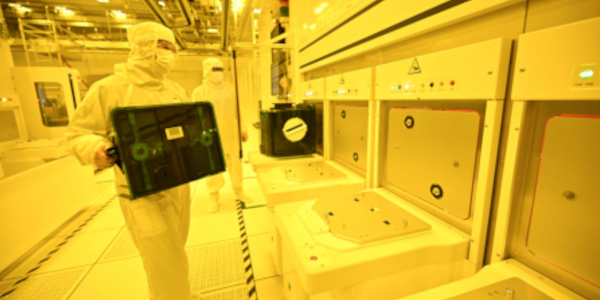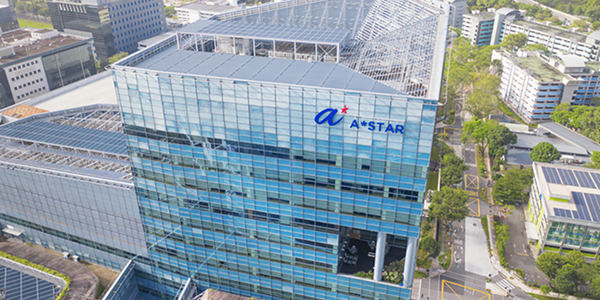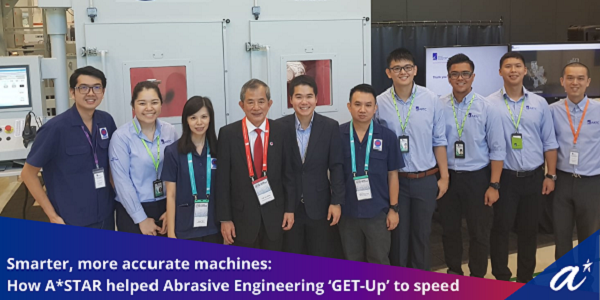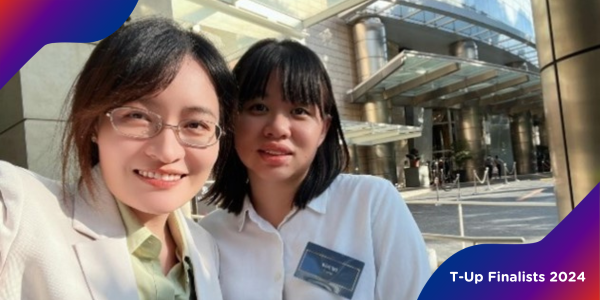INNOVATE
How Singapore Startup Cosmos Innovation Is Building The World’s Most Cost-effective And Efficient Solar Cells
They were like two chefs on a mission to create the perfect recipe. Except artificial intelligence (AI) scientists Joel Li and Vijay Chandrasekhar were not cooking with ingredients of the usual kind. Instead of salmon, mushrooms, green beans, and potatoes, they had metal, silicon, and perovskite – an earth-abundant material, with remarkable semiconductor properties, that is set to revolutionize the solar industry. Their dish? Next generation solar panels.
Solar energy has been a key player in the global push for decarbonisation. Currently, about 95 per cent of solar cells worldwide are made with silicon, a common semiconductor material.
However, studies show that silicon solar cells efficiency would soon reach its limit at 27 per cent, prompting researchers to look for alternative solutions.
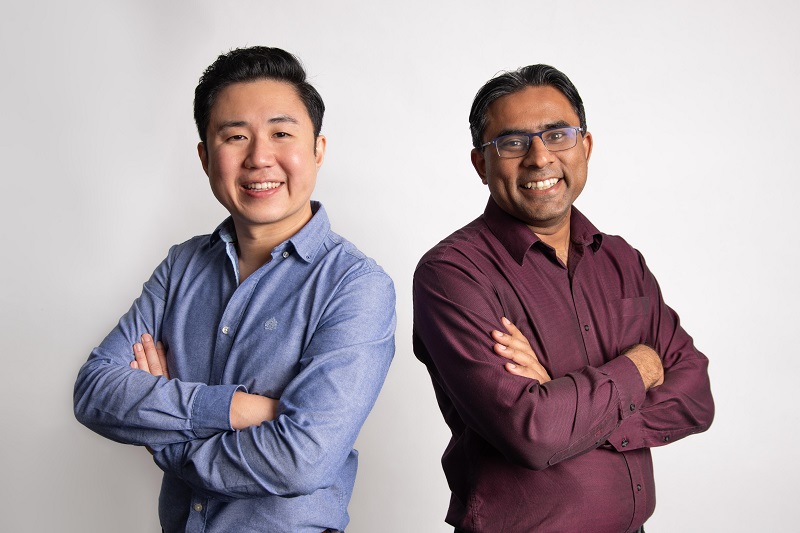
Cosmos Innovation Co-Founders Joel Li and Vijay Chandrasekhar
Tackling solar power efficiency
A study by leading German research firm Fraunhofer in 20231 found that perovskite silicon tandem solar cells could potentially increase efficiency to 39.5 per cent. It has become the most promising option beyond conventional silicon solar cells.
But factors such as scalability (panel size) and stability (the panel's lifespan) have made achieving the golden trifecta mix of efficiency, stability, and scalability quickly a challenge.
Dr. Chandrasekhar and Dr. Li, former colleagues at the Agency for Science, Technology and Research (A*STAR), co-founded Cosmos in 2020, with an initial focus on building their AI platform, Mobius, for accelerating process recipe development in the solar/semiconductor industry: conventionally, recipe development in this field has been a painstakingly slow process carried out using manual trial-and-error based experimentation.
In 2022, after demonstrating their disruptive AI platform technology with leading semiconductor companies and R&D institutes, the company decided to go vertical with the mission of building the world’s most cost-effective high-efficiency perovskite silicon tandem (PST) solar cells, to a capture a once-in-a-lifetime shift in the solar industry, as mainstream solar technology began reaching its fundamental limits.
Today, the firm is recognised by the World Economic Forum 2 as one of the top startups in the world and was part of the Technology Pioneers 2024 Cohort.
“There's AI everywhere, but there was no one working on AI for semiconductors, and more specifically for process optimisation and recipe development,” explained Dr Chandrasekhar, co-founder and chief executive officer.
His co-founder and chief technology officer, Dr Li, likened the process to cooking. “Similar to finding the recipe to make the best dish, we are working on finding the process recipe to make the most efficient solar panel.”
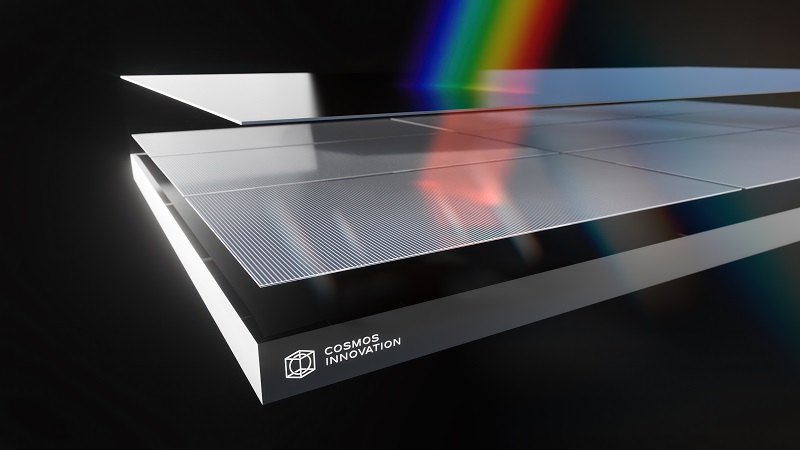
Rendering of Cosmos Innovation's Solar Panel
Technology roadmap programme by A*STAR provides a helping hand
Building up Mobius's AI capabilities in the early days was a key challenge.
The biggest pain point was getting access to data sets to build our models and capabilities for this particular domain. This is where A*STAR proves invaluable.
said Dr Vijay Chandrasekhar, CEO and Co-Founder, Cosmos Innovation
Cosmos worked with A*STAR's Institute of Microelectronics on projects involving advanced semiconductor technologies such as silicon carbide, a compound semiconductor. This helped them gather the data sets they needed.
“That partnership was very critical for us,” he added.
Cosmos constructed their in-house R&D line in 2023. The decision to go vertical, stemmed from the desire to build a product of their own.
Building up their own data sets was also more time and process efficient. Previously, Cosmos relied on their partners for data and had to guide them through the data collection process, said Dr Li.
These inconveniences would be solved with their own line. “We know how to run the line in the best way possible so as to collect the highest quality data needed for our AI engine,” he added.
Gathering top talent through the T-UP scheme
Beyond that, Cosmos had access to A*STAR talent under the Technology for Enterprise Capability Upgrading (T-Up) scheme. They had 5 projects under T-Up which is part of the umbrella programme A*STAR Growing Enterprises through Technology Upgrade (GET-Up), aimed to boost the global competitiveness of local tech startups.
Smaller firms would typically have to compete with larger, established companies for talent, but through the T-Up scheme, we could work with experts at A*STAR’s Institute for Infocomm Research (I²R), cutting short hiring time and directly gaining access to talent.
Dr Joel Li, Chief Technology Officer and Co-founder, Cosmos Innovation
“A*STAR has a large pool of AI talent which we could tap into and also for the specific capabilities we wanted to build upon,” said Dr Chandrasekhar.
Equipped with talent and unparalleled AI capabilities, the team was able to “accelerate process optimisation by 10 times (with Mobius)”, said Dr Li.
The results achieved were a game changer. What would normally have taken a year happened in just one month, he noted.
Results from their AI platform technology have been repeatedly demonstrated with leading companies, with outstanding outcomes - either a massive acceleration in recipe development time or step-function improvements in target performance metrics – enabling building next solar/semiconductor technologies in a fraction of the cost and time it would take using conventional methods.
These outstanding results were made possible through the valuable support from A*STAR, from experimental data to AI talent, the pair said.
But their work has only just begun. What is important, they noted, is to continue leveraging on their AI’s capabilities to develop next-generation solar cell technology and translate research to mass production in the near future.
1 Perovskite-silicon tandem solar cells have practical efficiency potential of 39.5%
2 Innovation gets honoured as a top startup by the World Economic Forum
Was the article helpful?
A*STAR celebrates International Women's Day

From groundbreaking discoveries to cutting-edge research, our researchers are empowering the next generation of female science, technology, engineering and mathematics (STEM) leaders.
Get inspired by our #WomeninSTEM

